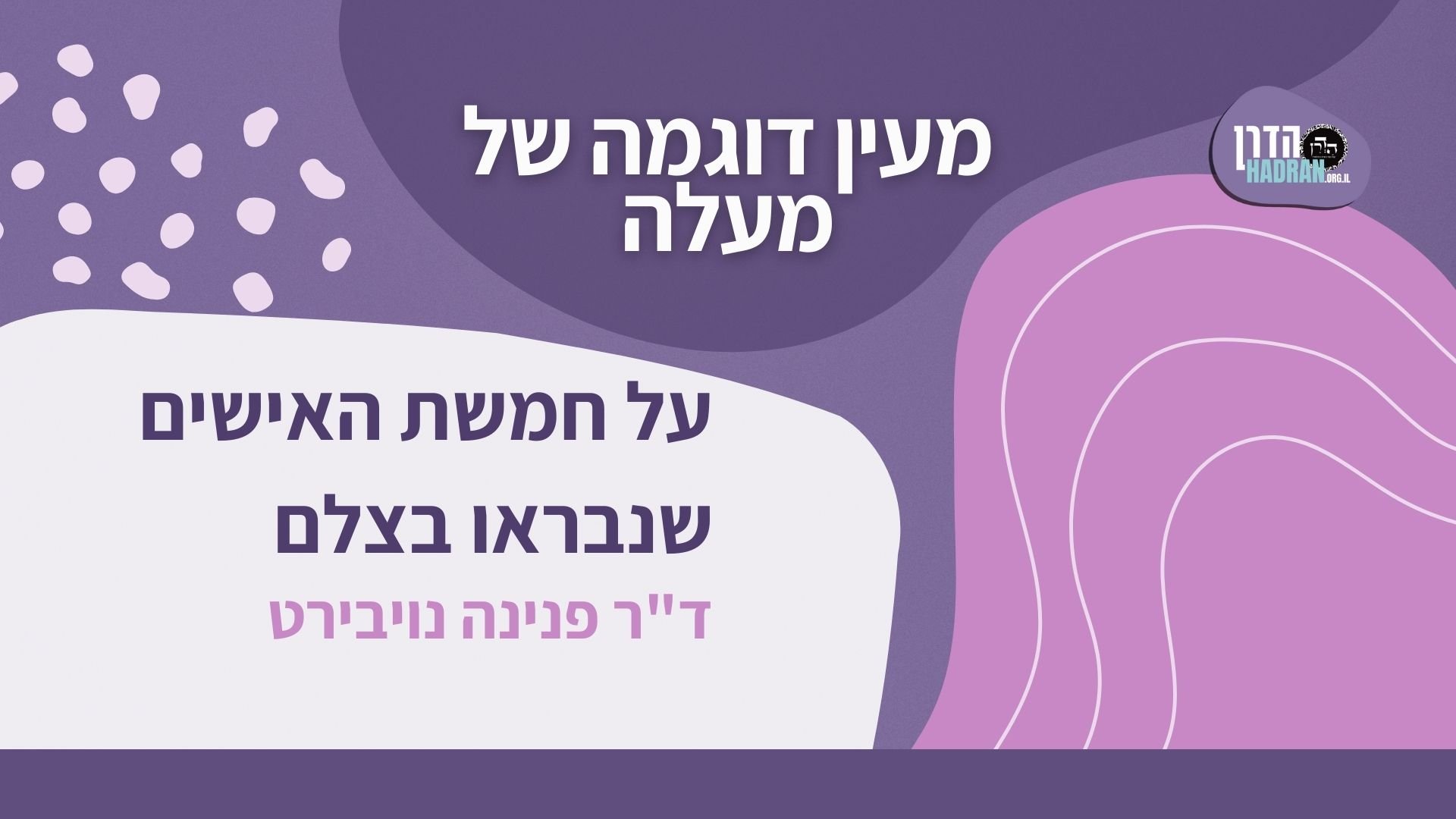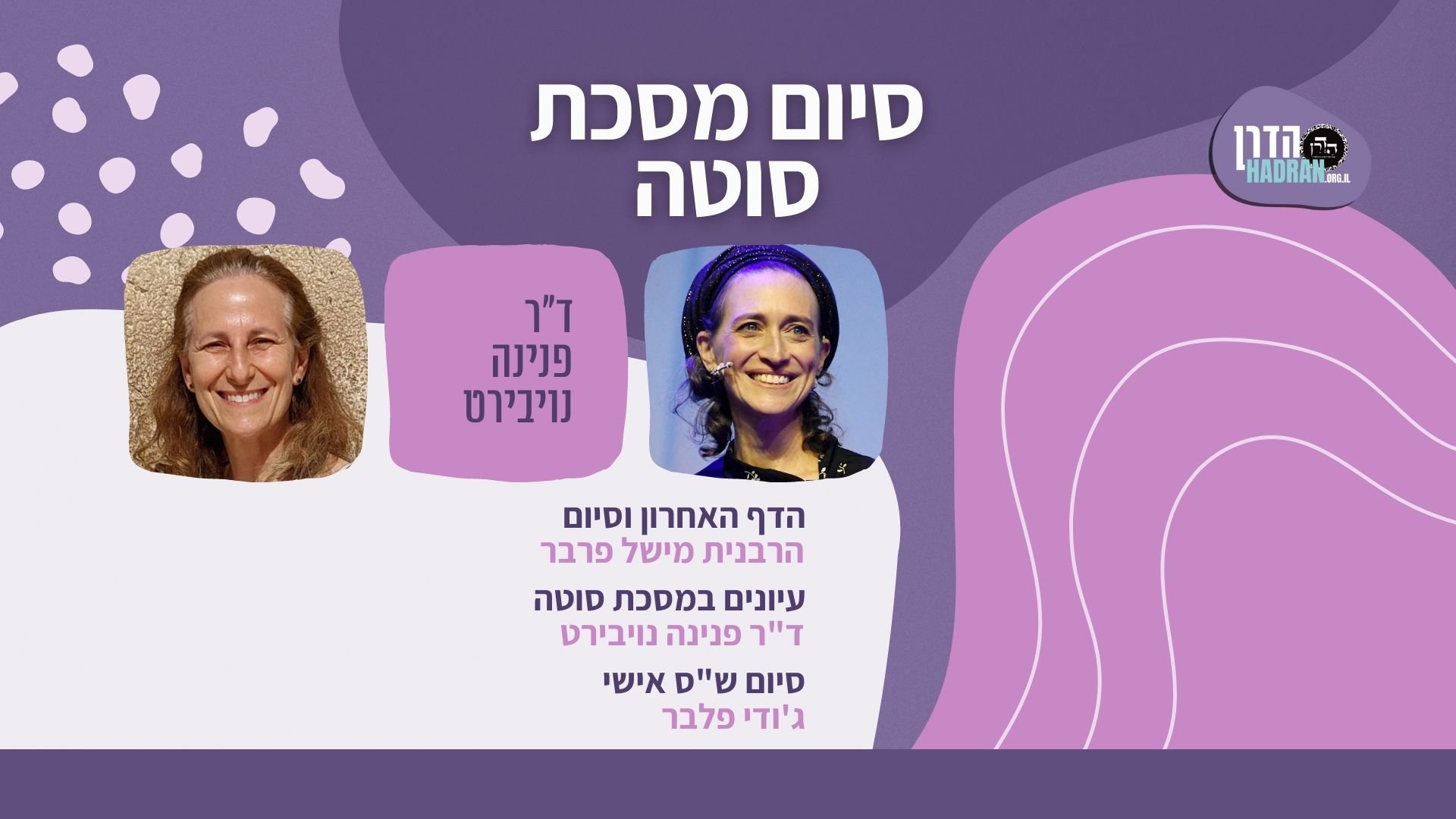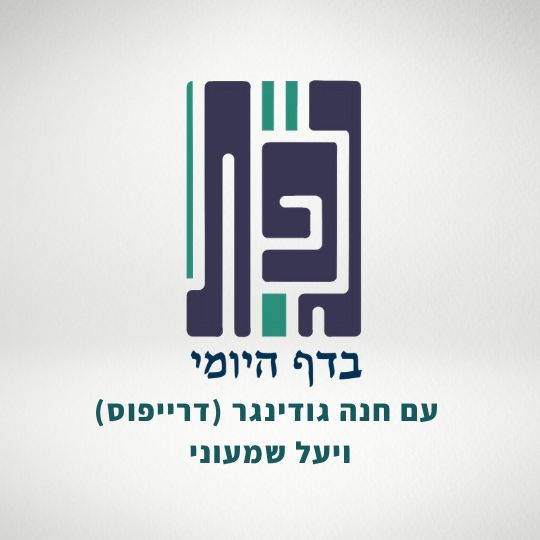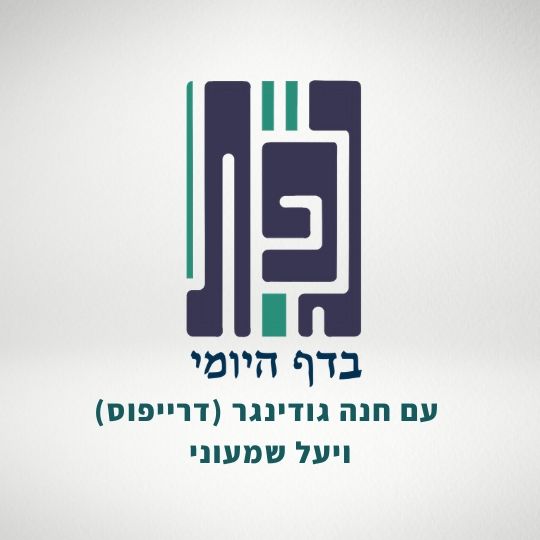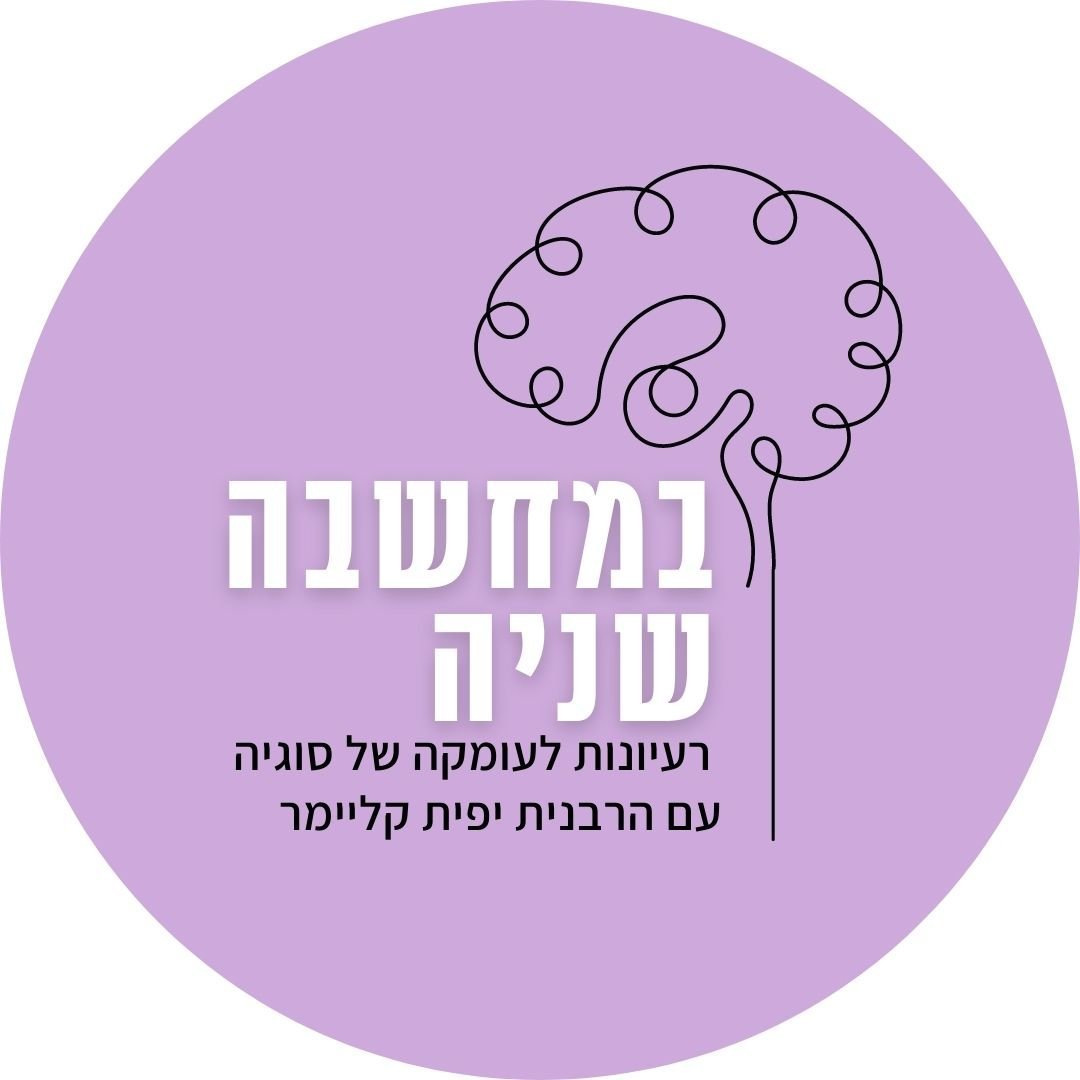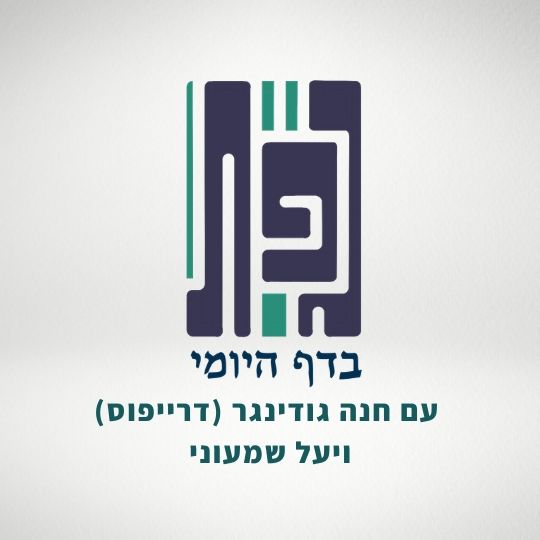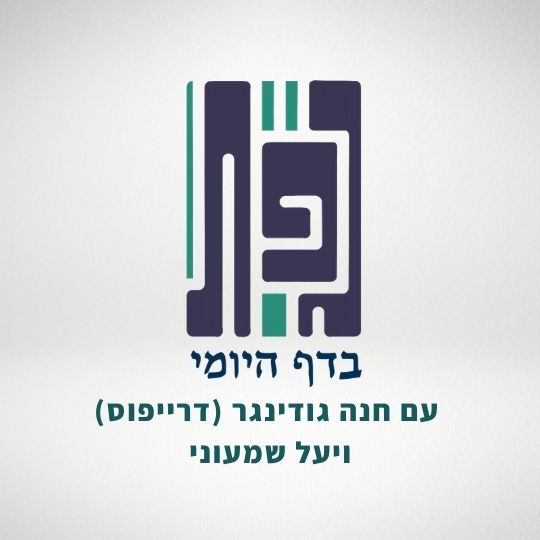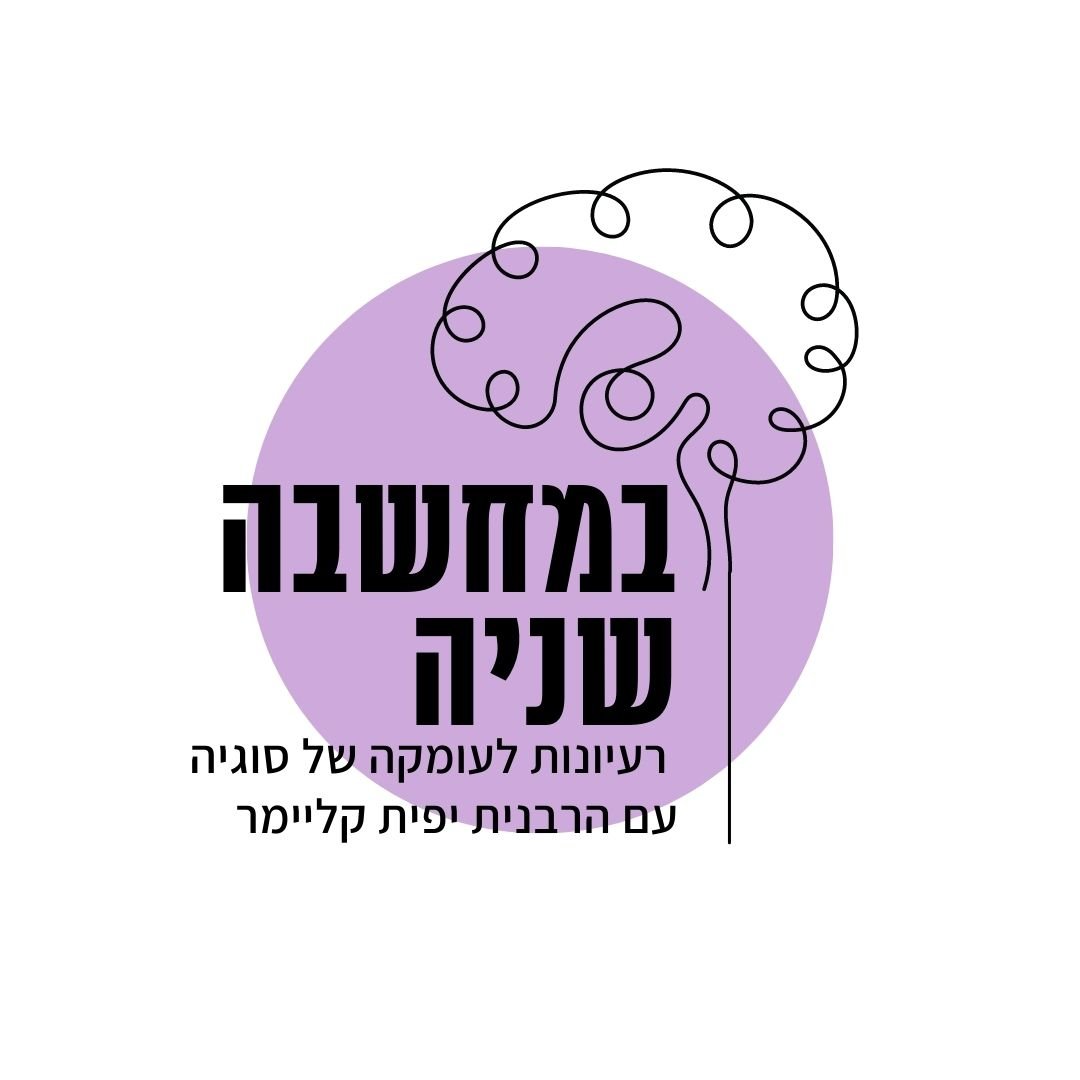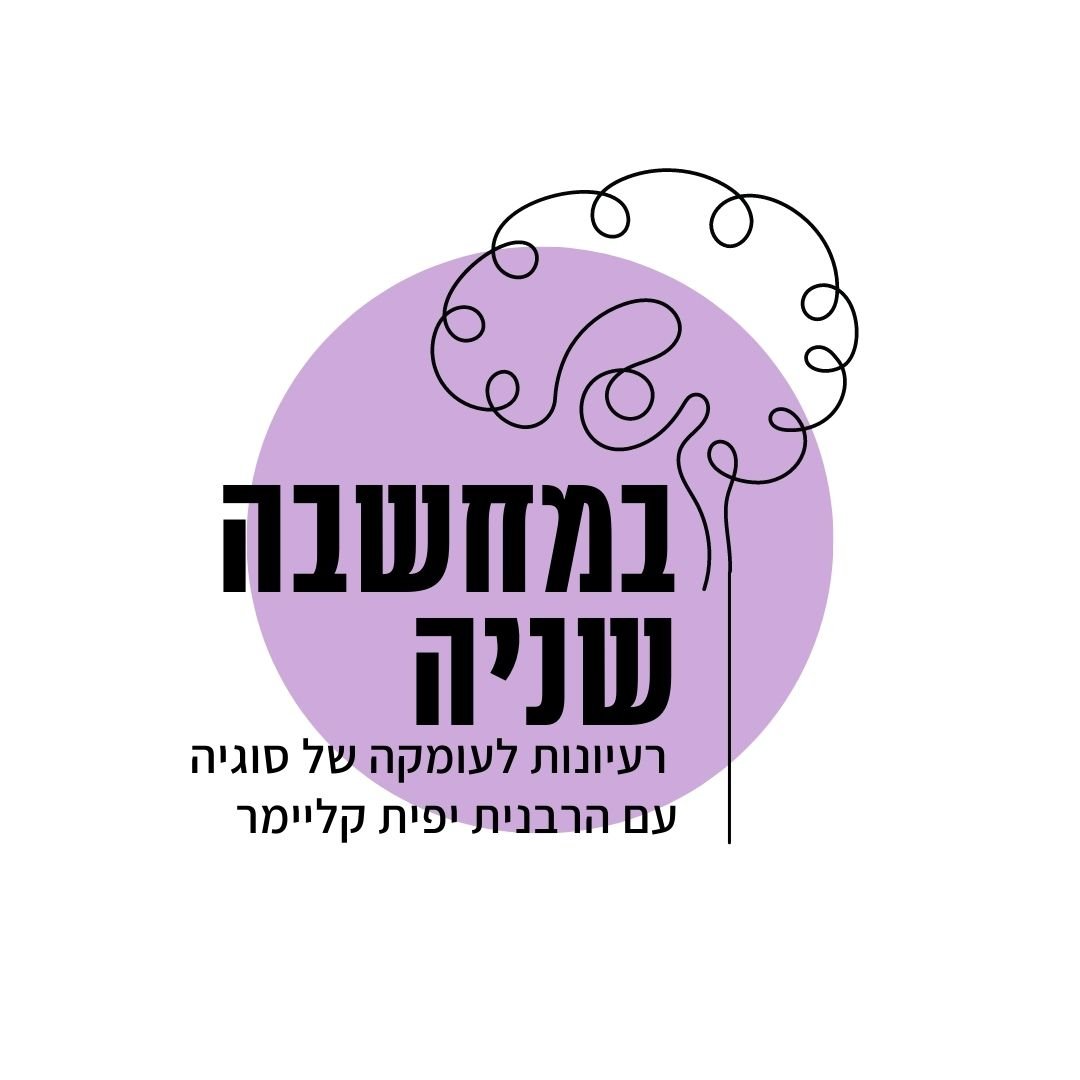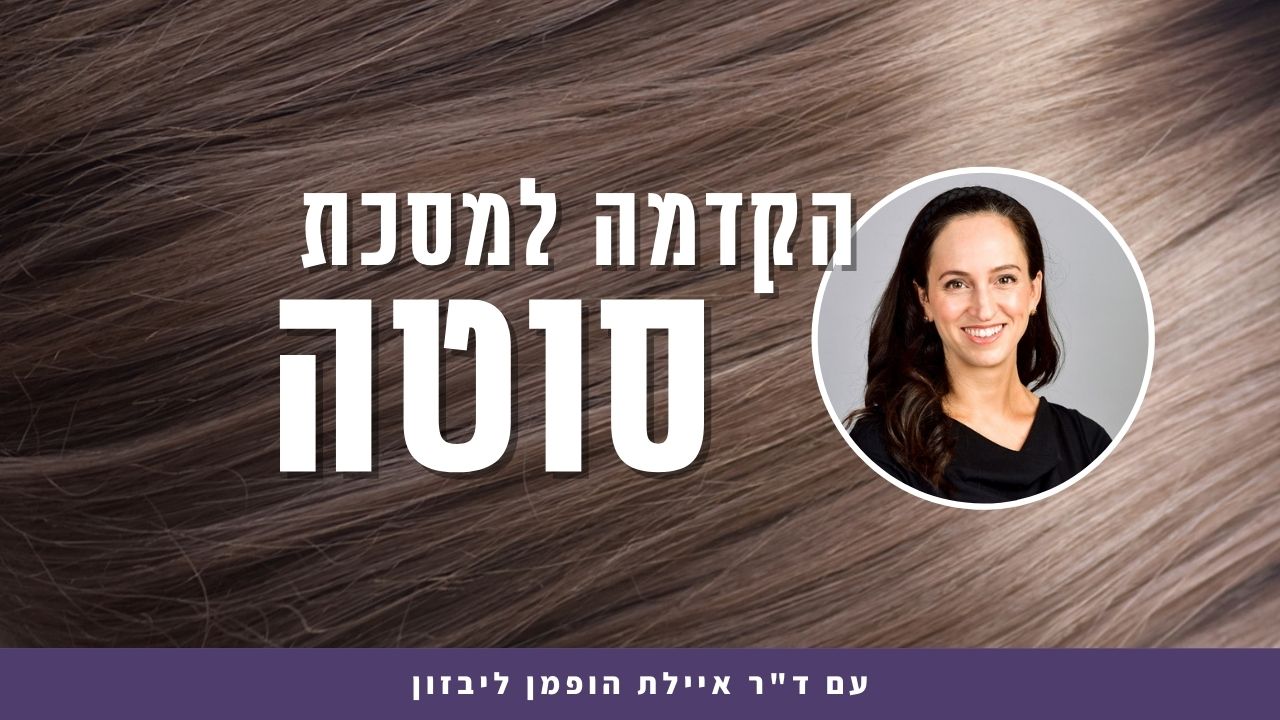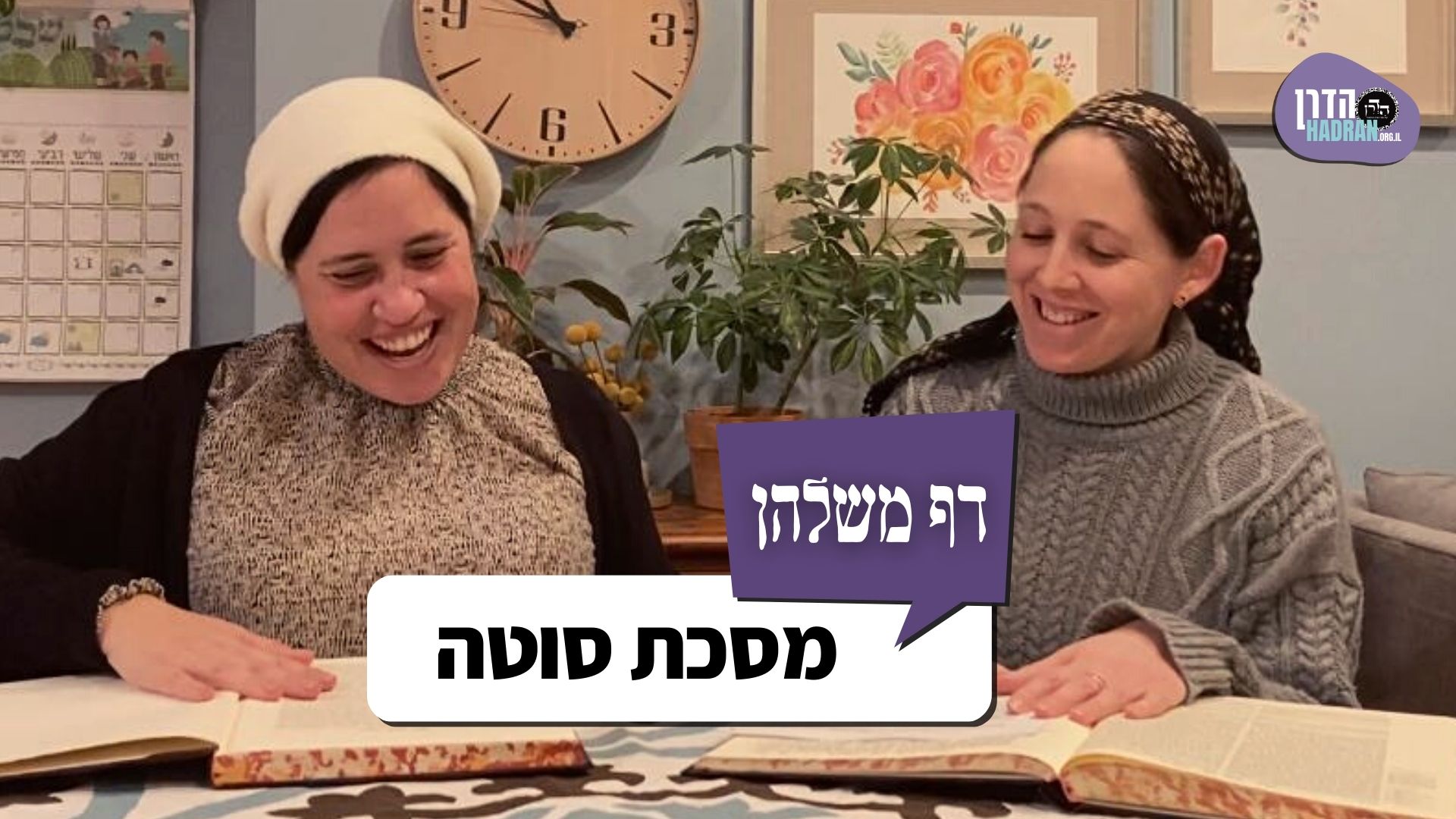סוטה כ
קַשְׁיָא דְּרַבִּי עֲקִיבָא אַדְּרַבִּי עֲקִיבָא: הָתָם אָמַר מְחִיקָה מְעַכְּבָא, וְהָכָא אָמַר קוֹמֶץ מְעַכֵּב!
The Gemara asks: The statement of Rabbi Akiva is difficult, as it is contradicted by another statement of Rabbi Akiva: There, in the first baraita, he said that erasure prevents the authorities from compelling the woman to drink the water if she retracted her decision to drink, and here he says that the sacrifice of the handful prevents the authorities from compelling the woman to drink the water. In other words, according to the first baraita the woman can retract her decision to drink until the scroll is erased, whereas according to the second baraita she can retract her decision until the handful is sacrificed.
תְּרֵי תַּנָּאֵי וְאַלִּיבָּא דְּרַבִּי עֲקִיבָא.
The Gemara responds: There is a dispute between two tanna’im, and they disagree with regard to the opinion of Rabbi Akiva. They disagree with regard to what point in time, according to Rabbi Akiva, is the final moment at which a woman can refuse to drink the bitter water without being forced to do so.
אִיבַּעְיָא לְהוּ: אָמְרָה אֵינִי שׁוֹתָה מֵחֲמַת בְּרִיּוּתָא, וְחָזְרָה וְאָמְרָה שׁוֹתָה אֲנִי, מַהוּ? כֵּיוָן דְּאָמְרָה אֵינִי שׁוֹתָה — טְמֵאָה אֲנִי קָאָמְרָה, וְכֵיוָן דְּאַחְזִיק נַפְשַׁהּ בְּטוּמְאָה, לָא מָצְיָא הָדְרָה בַּהּ. אוֹ דִילְמָא כֵּיוָן דְּאָמְרָה שׁוֹתָה אֲנִי — גַּלִּיָא דַּעְתַּהּ דְּמֵחֲמַת בִּיעֲתוּתָא הוּא דְּאָמְרָה. תֵּיקוּ.
A dilemma was raised before the Sages: If she initially said: I will not drink, while in a state of good health, and then she retracted her statement and said: I will drink, what is the halakha? Does one say that when she said: I will not drink, it is as if she confessed and said: I am defiled, and since she established herself as defiled she cannot retract her statement? Or perhaps when she said: I will drink, she revealed her thoughts that it was only due to fear that she said she will not drink? The Gemara concludes that the dilemma shall stand unresolved.
אָמַר אֲבוּהּ דִּשְׁמוּאֵל: צָרִיךְ שֶׁיִּתֵּן מַר לְתוֹךְ הַמַּיִם. מַאי טַעְמָא — דְּאָמַר קְרָא: ״מֵי הַמָּרִים״, שֶׁמָּרִים כְּבָר.
Shmuel’s father says: It is necessary for one to put a bitter substance into the water that the sota drinks. What is the reason for this? It is as the verse states: “And he shall blot them out into the water of bitterness” (Numbers 5:23), indicating that they are already bitter before the scroll is erased.
מַתְנִי׳ עַד שֶׁלֹּא נִמְחֲקָה הַמְּגִילָּה אָמְרָה ״אֵינִי שׁוֹתָה״ — מְגִילָּתָהּ נִגְנֶזֶת, וּמִנְחָתָהּ מִתְפַּזֶּרֶת עַל הַדֶּשֶׁן, וְאֵין מְגִילָּתָהּ כְּשֵׁרָה לְהַשְׁקוֹת בָּהּ סוֹטָה אַחֶרֶת. נִמְחֲקָה הַמְּגִילָּה וְאָמְרָה ״טְמֵאָה אֲנִי״ — הַמַּיִם נִשְׁפָּכִין, וּמִנְחָתָהּ מִתְפַּזֶּרֶת עַל בֵּית הַדֶּשֶׁן. נִמְחֲקָה הַמְּגִילָּה וְאָמְרָה ״אֵינִי שׁוֹתָה״ — מְעַרְעֲרִין אוֹתָהּ, וּמַשְׁקִין אוֹתָהּ בְּעַל כׇּרְחָהּ.
MISHNA: If before the scroll was erased she said: I will not drink, the scroll that was written for her is sequestered, and her meal-offering is burned and scattered over the place of the ashes, and her scroll is not fit to give to another sota to drink. If the scroll was erased and afterward she said: I am defiled, the water is poured out, and her meal-offering is scattered in the place of the ashes. If the scroll was already erased and she said: I will not drink, she is forced to drink against her will.
אֵינָהּ מַסְפֶּקֶת לִשְׁתּוֹת עַד שֶׁפָּנֶיהָ מוֹרִיקוֹת, וְעֵינֶיהָ בּוֹלְטוֹת, וְהִיא מִתְמַלֵּאת גִּידִין. וְהֵם אוֹמְרִים: הוֹצִיאוּהָ [הוֹצִיאוּהָ] שֶׁלֹּא תְּטַמֵּא הָעֲזָרָה.
When a guilty woman drinks she does not manage to finish drinking before her face turns green and her eyes bulge, and her skin becomes full of protruding veins, and the people standing in the Temple say: Remove her, so that she does not render the Temple courtyard impure by dying there.
אִם יֵשׁ לָהּ זְכוּת — הָיְתָה תּוֹלָה לָהּ. יֵשׁ זְכוּת תּוֹלָה שָׁנָה אַחַת, יֵשׁ זְכוּת תּוֹלָה שְׁתֵּי שָׁנִים, יֵשׁ זְכוּת תּוֹלָה שָׁלֹשׁ שָׁנִים. מִכָּאן אוֹמֵר בֶּן עַזַּאי: חַיָּיב אָדָם לְלַמֵּד אֶת בִּתּוֹ תּוֹרָה, שֶׁאִם תִּשְׁתֶּה תֵּדַע שֶׁהַזְּכוּת תּוֹלָה לָהּ. רַבִּי אֱלִיעֶזֶר אוֹמֵר: כׇּל הַמְלַמֵּד בִּתּוֹ תּוֹרָה — (כְּאִילּוּ) לוֹמְּדָהּ תִּפְלוּת.
The mishna limits the scope of the previous statement: If she has merit, it delays punishment for her and she does not die immediately. There is a merit that delays punishment for one year, there is a larger merit that delays punishment for two years, and there is a merit that delays punishment for three years. From here Ben Azzai states: A person is obligated to teach his daughter Torah, so that if she drinks and does not die immediately, she will know that some merit she has delayed punishment for her. Rabbi Eliezer says: Anyone who teaches his daughter Torah is teaching her promiscuity [tiflut].
רַבִּי יְהוֹשֻׁעַ אוֹמֵר: רוֹצָה אִשָּׁה בְּקַב וְתִפְלוּת, מִתִּשְׁעָה קַבִּין וּפְרִישׁוּת. הוּא הָיָה אוֹמֵר: חָסִיד שׁוֹטֶה, וְרָשָׁע עָרוּם, וְאִשָּׁה פְּרוּשָׁה, וּמַכּוֹת פְּרוּשִׁין — הֲרֵי אֵלּוּ מְבַלֵּי עוֹלָם.
Rabbi Yehoshua says: A woman desires to receive the amount of a kav of food and a sexual relationship [tiflut] rather than to receive nine kav of food and abstinence. He would say: A foolish man of piety, and a conniving wicked person, and an abstinent woman [perusha], and those who injure themselves out of false abstinence; all these are people who erode the world.
גְּמָ׳ אָמַר רַב יְהוּדָה אָמַר שְׁמוּאֵל מִשּׁוּם רַבִּי מֵאִיר: כְּשֶׁהָיִיתִי לָמֵד תּוֹרָה אֵצֶל רַבִּי עֲקִיבָא, הָיִיתִי מֵטִיל קַנְקַנְתּוֹם לְתוֹךְ הַדְּיוֹ, וְלֹא אָמַר לִי דָּבָר. כְּשֶׁבָּאתִי אֵצֶל רַבִּי יִשְׁמָעֵאל, אָמַר לִי: בְּנִי מָה מְלַאכְתֶּךָ? אָמַרְתִּי לוֹ: לַבְלָר אֲנִי. אָמַר לִי: בְּנִי, הֱוֵי זָהִיר, שֶׁמְּלַאכְתְּךָ מְלֶאכֶת שָׁמַיִם הִיא, שֶׁמָּא תַּחְסִיר אוֹת אַחַת אוֹ תֹּתִיר אוֹת אַחַת, נִמְצֵאתָ אַתָּה מַחְרִיב אֶת כָּל הָעוֹלָם כֻּלּוֹ.
GEMARA: Rav Yehuda says that Shmuel says in the name of Rabbi Meir: When I was studying Torah before Rabbi Akiva, as his disciple, I used to put iron sulfate into the ink with which I wrote Torah scrolls, and he did not say anything to me in protest. Afterward, when I came to learn Torah before Rabbi Yishmael, he said to me: My son, what is your vocation? I said to him: I am a scribe [lavlar] who writes Torah scrolls. He said to me: My son, be careful in your work, as your work is the work of Heaven, lest you omit a single letter from the Torah scroll or add a single letter, and in this you are found to be destroying the entire world if the mistake alters the meaning of the verse and results in blasphemy.
אָמַרְתִּי לוֹ: דָּבָר אֶחָד יֵשׁ לִי שֶׁאֲנִי מֵטִיל לְתוֹךְ הַדְּיוֹ, וְקַנְקַנְתּוֹם שְׁמוֹ. אָמַר לִי: וְכִי מְטִילִין קַנְקַנְתּוֹם לְתוֹךְ הַדְּיוֹ? הַתּוֹרָה אָמְרָה ״וּמָחָה״, כְּתָב שֶׁיּוּכַל לִמְחוֹת!
Rabbi Meir continues: I said to Rabbi Yishmael: I have one substance that I put into the ink, and it is called iron sulfate, which prevents the writing from being erased. He said to me: And may iron sulfate be put into the ink? The Torah clearly said with regard to the scroll of the sota: “And the priest shall write these curses in a scroll, and he shall blot them out into the water of bitterness” (Numbers 5:23). This indicates that the Torah requires writing that can be blotted out.
מַאי קָאָמַר לֵיהּ וּמַאי קָא מַהְדַּר לֵיהּ?
Since Rabbi Meir’s remark about iron sulfate seems unrelated to Rabbi Yishmael’s previous statement, the Gemara asks: What is Rabbi Yishmael saying to Rabbi Meir, and what is Rabbi Meir replying to Rabbi Yishmael?
הָכִי קָאָמַר לֵיהּ: לָא מִבַּעְיָא בַּחֲסֵירוֹת וִיתֵירוֹת דְּבָקִי אֲנָא, אֶלָּא אֲפִילּוּ לְמֵיחַשׁ לִזְבוּב דְּדִילְמָא אָתֵי וְיָתֵיב אַתָּגֵיהּ דְּדָלֶית וּמָחֵיק לֵיהּ וּמְשַׁוֵּי לֵיהּ רֵישׁ — דָּבָר אֶחָד יֵשׁ לִי שֶׁאֲנִי מֵטִיל לְתוֹךְ הַדְּיוֹ וְקַנְקַנְתּוֹם שְׁמוֹ.
The Gemara explains: This is what Rabbi Meir is saying to him: It is not necessary to say that I do not err in omissions and additions, as I am an expert. Rather, there is not even any reason for concern with regard to a fly lest it come and sit on the protrusion of the letter dalet and erase it, thereby rendering it the letter reish, which could be a critical error. There is no concern of this erasure occurring, since I have a certain substance that I put into the ink and that prevents the writing from being erased, and it is called iron sulfate.
אִינִי? וְהָא תַּנְיָא, אָמַר רַבִּי מֵאִיר: כְּשֶׁהָיִיתִי לָמֵד תּוֹרָה אֵצֶל רַבִּי יִשְׁמָעֵאל הָיִיתִי מֵטִיל קַנְקַנְתּוֹם לְתוֹךְ הַדְּיוֹ, וְלֹא אָמַר לִי דָּבָר. כְּשֶׁבָּאתִי אֵצֶל רַבִּי עֲקִיבָא אֲסָרָהּ עָלַי!
The Gemara questions the initial part of Rabbi Meir’s statement: Is that so? But isn’t it taught in a baraita that Rabbi Meir said: When I was studying Torah before Rabbi Yishmael, I used to put iron sulfate into the ink with which I wrote Torah scrolls, and he did not say anything to me. Afterward, when I came to learn Torah with Rabbi Akiva, he prohibited me from doing so.
קַשְׁיָא שִׁמּוּשׁ אַשִּׁמּוּשׁ. קַשְׁיָא אֲסָרָהּ אַאֲסָרָהּ!
The Gemara points out that there are two separate contradictions between the two statements: Rav Yehuda’s statement with regard to Rabbi Meir first serving Rabbi Akiva as a disciple is difficult, as it is contradicted by the statement of the baraita with regard to his first serving Rabbi Yishmael. Furthermore, Rav Yehuda’s statement is difficult, since he states that it was Rabbi Yishmael who prohibited the addition of iron sulfate, and this is contradicted by the statement of the baraita that it was Rabbi Akiva who prohibited it.
בִּשְׁלָמָא שִׁמּוּשׁ אַשִּׁמּוּשׁ לָא קַשְׁיָא: מֵעִיקָּרָא אֲתָא לְקַמֵּיהּ דְּרַבִּי עֲקִיבָא. כֵּיוָן דְּלָא מָצֵי (קָם) [לְמֵיקַם] אַלִּיבֵּיהּ, אֲתָא לְקַמֵּיהּ דְּרַבִּי יִשְׁמָעֵאל, וּגְמַר גְּמָרָא. הֲדַר אֲתָא לְקַמֵּיהּ דְּרַבִּי עֲקִיבָא סָבַר סְבָרָא.
The Gemara answers: Granted, the apparent contradiction between Rav Yehuda’s statement with regard to Rabbi Meir’s serving Rabbi Akiva first, and the statement of the baraita with regard to serving Rabbi Yishmael first, poses no difficulty. Initially, he came before Rabbi Akiva to study, but since he could not comprehend his extremely complicated method of learning, he came before Rabbi Yishmael and learned the oral tradition from him. Afterward, he returned and came before Rabbi Akiva and studied his method of logical reasoning in order to understand the reasons behind the halakhot he had already learned.
אֶלָּא אֲסָרָהּ אַאֲסָרָהּ קַשְׁיָא! קַשְׁיָא.
However, the contradiction between Rav Yehuda’s statement that it was Rabbi Yishmael who prohibited the addition of iron sulfate and the statement of the baraita that it was Rabbi Akiva who prohibited it still poses a difficulty. The Gemara concludes: Indeed, the matter is difficult.
תַּנְיָא, רַבִּי יְהוּדָה אוֹמֵר, אוֹמֵר הָיָה רַבִּי מֵאִיר: לַכֹּל מְטִילִין קַנְקַנְתּוֹם לְתוֹךְ הַדְּיוֹ,
It is taught in a baraita: Rabbi Yehuda says that Rabbi Meir would say: Iron sulfate may be put into the ink that is used for all sacred writings, i.e., Torah scrolls, phylacteries, and mezuzot,
חוּץ מִפָּרָשַׁת סוֹטָה בִּלְבַד. רַבִּי יַעֲקֹב אוֹמֵר מִשְּׁמוֹ: חוּץ מִפָּרָשַׁת סוֹטָה שֶׁל מִקְדָּשׁ. מַאי בֵּינַיְיהוּ? אָמַר רַבִּי יִרְמְיָה: לִמְחוֹק לָהּ מִן הַתּוֹרָה אִיכָּא בֵּינַיְיהוּ.
except for the ink used to write the Torah passage about the sota, even when written in a Torah scroll. Rabbi Ya’akov says in the name of Rabbi Meir: It is except for the ink used to write the scroll with the sota passage used in the Temple. The Gemara asks: What is the difference between these two opinions? The Gemara replies: Rabbi Yirmeya says that there is a difference between them with regard to whether it is permitted to erase the passage for the sota from a Torah scroll. According to Rabbi Yehuda, Rabbi Meir holds that this is permitted, and therefore the passage in the Torah scroll must be written with ink that does not contain iron sulfate, so that it can be erased. By contrast, according to Rabbi Ya’akov, Rabbi Meir holds that it is prohibited to erase the passage from a Torah scroll, and therefore the passage may be written with ink containing iron sulfate.
וְהָנֵי תַּנָּאֵי כִי הָנֵי תַּנָּאֵי. דְּתַנְיָא: אֵין מְגִילָּתָהּ כְּשֵׁירָה לְהַשְׁקוֹת בָּהּ סוֹטָה אַחֶרֶת. רַבִּי אַחַי בַּר יֹאשִׁיָּה אוֹמֵר: מְגִילָּתָהּ כְּשֵׁירָה לְהַשְׁקוֹת בָּהּ סוֹטָה אַחֶרֶת.
The Gemara assumes that according to Rabbi Ya’akov it is prohibited to erase the passage from a Torah scroll, since he holds that the scroll must be written for the sake of the sota, whereas Rabbi Yehuda, who permits this, holds that the scroll need not be written for the sake of the sota. And therefore, the opinions of these tanna’im are parallel to the opinions of those tanna’im, as it is taught in a baraita: The scroll of one sota is not fit to be used in the preparation of the water to give to another sota to drink, as it was not written for the sake of the other sota. Rabbi Aḥai bar Yoshiya says: Her scroll is fit to be used in the preparation of the water to give to another sota to drink, since it does not need to be written for the sake of the sota.
אָמַר רַב פָּפָּא, דִּילְמָא לָא הִיא: עַד כָּאן לָא קָאָמַר תַּנָּא קַמָּא הָתָם, אֶלָּא כֵּיוָן דְּאִינְּתִיק לְשׁוּם רָחֵל — לָא הָדְרָא מִינַּתְקָא לְשׁוּם לֵאָה, אֲבָל תּוֹרָה, דִּסְתָמָא כְּתִיבָה — הָכִי נָמֵי דְּמָחֲקִינַן.
Rav Pappa said: Perhaps that is not so, and the two disputes are not comparable. It is possible that the first tanna of the baraita states that the scroll may not be used for another sota only there, in the case if a scroll written for a specific woman; since it was originally designated in the name of one woman, e.g., Rachel, it cannot again be designated in the name of another woman, e.g., Leah. However, in the case of a Torah scroll, which is written without specifying anyone, indeed we may erase the passage to prepare the water for a sota even though it was not written for her sake.
אָמַר רַב נַחְמָן בַּר יִצְחָק: דִּילְמָא לָא הִיא, עַד כָּאן לָא קָאָמַר רַבִּי אַחַי בַּר יֹאשִׁיָּה הָתָם אֶלָּא בִּמְגִילָּה, דְּאִיכְּתוּב לְשׁוּם אָלוֹת בָּעוֹלָם. אֲבָל תּוֹרָה, דִּלְהִתְלַמֵּד כְּתִיבָה, הָכִי נָמֵי דְּלָא מָחֲקִינַן.
Rav Naḥman bar Yitzḥak said that the comparison between the two disputes can be refuted for a different reason: Perhaps that is not so. It is possible that Rabbi Aḥai bar Yoshiya states that the scroll may be used for another sota only there, with regard to the scroll written for a specific sota, as it was written for the purpose of the curses of a sota in general. However, in the case of a Torah scroll, which is written to be learned from, indeed we may not erase it for a sota, as it was not written for the sake of a sota at all.
וְרַבִּי אַחַי בַּר יֹאשִׁיָּה לֵית לֵיהּ כָּתַב לְגָרֵשׁ אֶת אִשְׁתּוֹ וְנִמְלַךְ, מְצָאוֹ בֶּן עִירוֹ וְאָמַר לוֹ: שְׁמִי כְּשִׁמְךָ, וְשֵׁם אִשְׁתִּי כְּשֵׁם אִשְׁתְּךָ — פָּסוּל לְגָרֵשׁ בּוֹ?
The Gemara asks: And doesn’t Rabbi Aḥai bar Yoshiya hold in accordance with that which is taught in a mishna (Gittin 24a): With regard to one who wrote a bill of divorce with which to divorce his wife but later reconsidered and did not divorce her, if a resident of his city found him and said to him: My name is the same as your name, and my wife’s name is the same as your wife’s name; give me the bill of divorce, and I will use it to divorce my wife, it is unfit to divorce the other woman with it. The reason for this is that it was written for the sake of another woman. Seemingly, the same principle should apply with regard to the scroll of a sota.
אָמְרִי: הָתָם ״וְכָתַב לָהּ״ אָמַר רַחֲמָנָא, בָּעִינַן כְּתִיבָה לִשְׁמָהּ: הָכָא נָמֵי ״וְעָשָׂה לָהּ״! מַאי עֲשִׂיָּיה — מְחִיקָה.
The Sages say in response: There, with regard to a bill of divorce, the Merciful One states: “And he shall write for her a bill of divorce” (Deuteronomy 24:1). This teaches that we require the writing to be performed for the sake of the specific woman. However, no similar requirement is mentioned with regard to a sota. The Gemara asks: Here, too, with regard to the sota, the verse states: “And the priest shall perform with her all of this law” (Numbers 5:30), indicating that the ritual must be performed for the sake of the specific woman. The Gemara answers: What is the performance referred to in the verse? It is referring to the erasure, whereas the writing need not be done for the sake of a specific woman.
אֵינָהּ מַסְפֶּקֶת לִשְׁתּוֹת עַד שֶׁפָּנֶיהָ [כּוּ׳]. מַנִּי — רַבִּי שִׁמְעוֹן הִיא, דְּאָמַר: מַקְרִיב אֶת מִנְחָתָהּ וְאַחַר כָּךְ מַשְׁקָהּ. דְּכַמָּה דְּלָא קָרְבָה מִנְחָתַהּ — לָא בָּדְקִי לַהּ מַיָּא, דִּכְתִיב: ״מִנְחַת זִכָּרוֹן מַזְכֶּרֶת עָוֹן״,
§ The mishna states: When a guilty woman drinks she does not manage to finish drinking before her face turns green and her eyes bulge, and her skin becomes full of protruding veins. The Gemara asks: In accordance with whose opinion is this mishna, which indicates that the water evaluates her while she is still drinking? It is in accordance with the opinion of Rabbi Shimon, who says: The priest sacrifices her meal-offering and afterward forces her to drink, because according to the opinion of the Rabbis the meal-offering is sacrificed only after she drinks, and as long as her meal-offering has not been sacrificed the water does not evaluate her, as it is written: “And he shall bring her offering for her…for it is a meal-offering of jealousy, a meal-offering of remembrance, a reminder of iniquity” (Numbers 5:15).
אֵימָא סֵיפָא: יֵשׁ לָהּ זְכוּת הָיְתָה תּוֹלָה לָהּ, אֲתָאן לְרַבָּנַן, דְּאִי רַבִּי שִׁמְעוֹן, הָאָמַר: אֵין זְכוּת תּוֹלָה בַּמַּיִם הַמָּרִים!
The Gemara asks: Say the latter clause of the mishna: If she has merit, it delays her punishment for her. We arrive at the opinion of the Rabbis, as, if this statement were in accordance with the opinion of Rabbi Shimon, didn’t he say: Merit does not delay punishment in the case of the bitter water of a sota?
אָמַר רַב חִסְדָּא: הָא מַנִּי — רַבִּי עֲקִיבָא הִיא, דְּאָמַר: מַקְרִיב אֶת מִנְחָתָהּ וְאַחַר כָּךְ מַשְׁקָהּ, וּבִזְכוּת סָבַר לַהּ כְּרַבָּנַן.
Rav Ḥisda said: In accordance with whose opinion is this mishna? It is in accordance with the opinion of Rabbi Akiva, who says: The priest sacrifices her meal-offering and afterward forces her to drink. With regard to the order of the ritual he holds in accordance with Rabbi Shimon, and with regard to the matter of merit delaying punishment, he holds in accordance with the opinion of the Rabbis.
וְהֵם אוֹמְרִים הוֹצִיאוּהָ וְכוּ׳. מַאי טַעְמָא — דְּדִילְמָא מֵתָה. לְמֵימְרָא דְּמֵת אָסוּר בְּמַחֲנֵה לְוִיָּה?
§ The mishna states: And the people standing in the Temple say: Remove her, so that she does not render the Temple courtyard impure. The Gemara explains: What is the reason for this? It is lest she die there immediately and render the women’s courtyard, where she drinks the water, impure. The Gemara asks: Is this to say that a corpse is prohibited from being in the women’s courtyard, which has the same status as the Levite camp in the desert?
וְהָתַנְיָא: טְמֵא מֵת מוּתָּר לִיכָּנֵס לְמַחֲנֵה לְוִיָּה. וְלֹא טְמֵא מֵת בִּלְבַד אָמְרוּ, אֶלָּא אֲפִילּוּ מֵת עַצְמוֹ, שֶׁנֶּאֱמַר: ״וַיִּקַּח מֹשֶׁה אֶת עַצְמוֹת יוֹסֵף עִמּוֹ״, עִמּוֹ בִּמְחִיצָתוֹ!
But isn’t it taught in a baraita: One who is ritually impure with impurity imparted by a corpse is permitted to enter the Levite camp. And the Sages said this not only with regard to one who is ritually impure with impurity imparted by a corpse; rather, even a corpse itself may be brought into the Levite camp, as it is stated: “And Moses took the bones of Joseph with him” (Exodus 13:19), which is interpreted to mean: With him, in his vicinity, even though Moses was in the Levite camp.
אָמַר אַבָּיֵי: שֶׁמָּא תִּפְרוֹס נִדָּה. לְמֵימְרָא דְּבִיעֲתוּתָא מְרַפְּיָא? אִין, דִּכְתִיב: ״וַתִּתְחַלְחַל הַמַּלְכָּה מְאֹד״, וְאָמַר רַב: שֶׁפֵּירְסָה נִדָּה. וְהָא אֲנַן תְּנַן: חֲרָדָה מְסַלֶּקֶת דָּמִים! פַּחְדָּא צָמֵית, בִּיעֲתוּתָא מְרַפְּיָא.
Abaye said: The woman is removed not due to a concern that she will die there but lest the fear of the water cause her to begin to menstruate, and it is prohibited for a menstruating woman to enter the Levite camp. The Gemara asks: Is this to say that fear causes muscular relaxation and menstrual bleeding? The Gemara responds: Yes, as it is written: “And the Queen was exceedingly pained” (Esther 4:4), and Rav says: This means that she began to menstruate. The Gemara asks: But didn’t we learn in a mishna (Nidda 39a) that trepidation eliminates the flow of menstrual blood? Presumably, the sota experiences trepidation. The Gemara answers: Trepidation generated by extended worry contracts the muscles and prevents the blood from flowing, but sudden fear relaxes the muscles and causes the blood to flow.
יֵשׁ לָהּ זְכוּת הָיְתָה וְכוּ׳. מַנִּי מַתְנִיתִין? לָא אַבָּא יוֹסֵי בֶּן חָנָן, וְלָא רַבִּי אֶלְעָזָר בֶּן יִצְחָק אִישׁ כְּפַר דָּרוֹם, וְלֹא רַבִּי יִשְׁמָעֵאל.
§ The mishna states: If she has merit, it delays punishment…for one year…for two years…for three years. The Gemara asks: Whose opinion is expressed in the mishna? It is not the opinion of Abba Yosei ben Ḥanan, and not the opinion of Rabbi Elazar ben Yitzḥak of Kefar Darom, and not the opinion of Rabbi Yishmael.
דְּתַנְיָא: אִם יֵשׁ לָהּ זְכוּת תּוֹלָה לָהּ שְׁלֹשָׁה חֳדָשִׁים, כְּדֵי הַכָּרַת הָעוּבָּר, דִּבְרֵי אַבָּא יוֹסֵי בֶּן חָנָן. רַבִּי אֶלְעָזָר בֶּן יִצְחָק אִישׁ כְּפַר דָּרוֹם אוֹמֵר: תִּשְׁעָה חֳדָשִׁים, שֶׁנֶּאֱמַר: ״וְנִקְּתָה וְנִזְרְעָה זָרַע״, וּלְהַלָּן הוּא אוֹמֵר: ״זֶרַע יַעַבְדֶנּוּ יְסֻפַּר״, זֶרַע הָרָאוּי לְסַפֵּר.
This is as it is taught in a baraita: If she has merit, it delays punishment for her for three months, equivalent to the time necessary to recognize the fetus; this is the statement of Abba Yosei ben Ḥanan. Rabbi Elazar ben Yitzḥak of Kefar Darom says: Merit delays punishment for nine months, as it is stated: “Then she shall be cleared, and shall conceive seed” (Numbers 5:28). It is possible to infer from this that if she has merit she will be cleared temporarily, for the length of time required to conceive a child, and there, in Psalms, it says: “A seed shall serve him; it shall be told of the Lord unto the next generation” (Psalms 22:31). This indicates that the seed must be fit to tell of the Lord once it matures, and a child can live only if it is born after the culmination of nine months in the womb.
רַבִּי יִשְׁמָעֵאל אוֹמֵר: שְׁנֵים עָשָׂר חֹדֶשׁ. וְאַף עַל פִּי שֶׁאֵין רְאָיָה לַדָּבָר — זֵכֶר לַדָּבָר, דִּכְתִיב: ״לָהֵן מַלְכָּא מִלְכִּי יִשְׁפַּר עֲלָיךְ וַחֲטָיָךְ בְּצִדְקָה פְרֻק וַעֲוָיָתָךְ בְּמִחַן עֲנָיִן
Rabbi Yishmael says: Merit delays punishment for twelve months. And although there is no explicit proof for the concept of merit delaying punishment for twelve months, there is an allusion to the concept, as it is written that Daniel said to Nebuchadnezzar after interpreting Nebuchadnezzar’s dream concerning the evil which would befall him: “Therefore, O king, let my counsel be acceptable to you, and redeem your sins with charity, and your iniquities by showing mercy to the poor;

